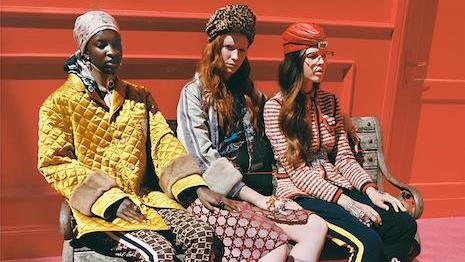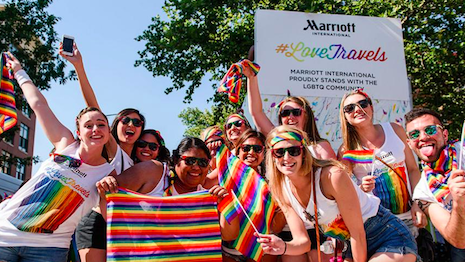Millennials expect brands to be more value-conscious, though not necessarily in the way marketers have come to anticipate.
A report from Morning Consult finds that honesty, quality and customer service are among the most important brand traits for millennials to drive loyalty. While much has been made of the impact of brands' political values on younger shoppers, this survey shows some experts may have been overemphasizing the importance of these positions on millennials' decision making.
"The most surprising finding in the report is that millennials are only somewhat concerned about a brand's political and social stances, especially in such a politically-charged climate," said T. Anthony Patterson, director of communications at Morning Consult, New York.
Morning Consult polled more than 2,000 U.S. adults to determine what expectations millennials have for brands and their shopping experiences. In this study, millennials are defined as those between ages 22 and 37, while those between 18 and 21 are Gen Z. Boomers are between 54 and 72, and Gen Xers are between 38 and 53.
Millennial values
The five most important values to millennials are honesty, reliability, helping family, compassion and commitment.
Millennials take into consideration how companies treat their own employees. Fifty-one percent say that they prefer a company if it pays employees well, while 40 percent say they like a company more if it is considered a place people enjoy working.

Many luxury brands are attempting to attract millennials as their purchasing power grows. Image credit: Gucci
More than a third of millennials, 38 percent, say they appreciate when a company gives a small share of its profits to support good causes.
However, most millennials do not place a high value on goods that are made stateside, with only 39 percent saying they like when a company’s products are made in the U.S. On the other hand, the majority of boomers, 58 percent, have a strong affinity for domestically-made products.
While there is a perception that millennials are politically aware and active, the majority of this generation does not take a company’s political agenda into account when making purchasing decisions. Almost a quarter of millennials, 24 percent, have boycotted a company in the last year, and only 26 percent of the boycotters say that their actions were political in nature.
If a brand wants to share its political inclinations with millennials, the least controversial issues to support are civil rights and gay rights.

Gay rights is among the least controversial subject for a brand to openly support. Image credit: Marriott International
For instance, luxury brands showed their support for the LGBT community through charitable initiatives, merchandise and events during Pride Month.
Pride Month is an annual celebration of the impact that lesbian, gay, bisexual and transgender individuals have had on history. Luxury brands reached out with messages of inclusivity and encouragement (see story).
When it comes to brand loyalty, millennials — similarly to other demographics — turn to brands that are well-priced for the quality. Nearly half of millennials, 48 percent, admit to having some brand preferences but will also consider alternatives.
The easiest way for a company to lose a millennial’s loyalty is to have poor customer service.
Ecommerce giant Amazon is the only retailer to place in the top five most-loved brand by millennials.
Amazon has been known for its customer-forward strategy since its inception. Amazon Prime members pay an annual membership fee in exchange for a better experience, including special discounts and faster shipping times.
Prime Day, which has deals reserved solely for Prime members, grew 60 percent year-over year in 2017. During last year’s 30-hour event, Amazon saw its greatest sales on a single day in its history, and also added the largest number of new Prime subscribers in a day (see story).
Despite the rise of ecommerce and digital marketing, the bricks-and-mortar retail experience remains a key factor in consumers’ purchase decisions. Finding ways to fuse the physical and the digital will be key for retailers going forward, as millennials are more likely than the average consumer to take advantage of cross-channel services (see story).
Attracting millennials
For years, marketers and retailers have been debating how to best reach millennials as their purchasing power grows.
Millennials are set to become 50 percent of the market in approximately five years.
As these shoppers are getting older, they are spending more and they are more loyal then any other segment. They value extravagance and fun, and are looking to be unique (see story).
Many luxury brands are focusing on more narrative and diverse digital campaigns to attract more of this age group.
Recently, Italian fashion label Dolce & Gabbana looked to inspire consumers through a new millennial-centric editorial section of its online store.
Dolce & Gabbana’s Stories features photo spreads of young models donning its designs for activities such as grocery shopping. Stories fits into Dolce & Gabbana’s recent proactive appeal to up-and-coming luxury buyers, as it looks ahead at the future drivers of the business.
The brand introduced the section to consumers via an email campaign, inviting them to "enter the millennials' world and find [their] inspiration” (see story).
Luxury retailers are also relying on influencers and celebrities to capture the attention of millennials, especially young women.
For instance, French fashion label Longchamp has tapped Kendall Jenner to gain attention in the United States with younger consumers.
Ms. Jenner is the newest face for Longchamp, representing the fall/winter 2018 collection. Hoping to come across as fresh and trendy for a younger crowd in the U.S., the French label has been working with a series of popular young women (see story).
French fashion house Chanel’s marketing efforts have been trending towards younger woman, including its Beauty Talks series on YouTube.
Most recently, Chanel’s global creative makeup and color designer Lucia Pica sat down with actress and activist Yara Shahidi to highlight a new makeup palette. Ms. Shahidi — a biracial actress and activist— follows in the steps of other young women, including Lily-Rose Depp, who have been featured in Beauty Talks (see story).
{"ct":"MYvFHHXoRWwG3Rwk2gzyXN9cco82DLkuogYKdALZhRS9tvhfILEkxkwKTLfwgiEWKZzGEbL0ex3N6doF73I+WN4wTibY2t8KLhEf7WwAnxgyMWrNal8gGXzDVmX4ia1lhpgN8zwQtnuDmSq+OHh6YhK3dFoVydizCVynbrqOh4kGKq9WtGr9y9MTf8x\/wA0zrL3sKeHTNn62rNB4GqQCm9WEkpS8kJYzmu\/sRPp2anP2TzlSnb0zZanhTApvNNox0BXGwF2I1D0lNJpYV30jI7VBCLR15TXPtNaXmWxFN\/9B11DvxOwKD8T7qG2jjjriW\/aSQJgAeWXM+XzWoSiUKZ4GeB6zg8S0ANy9JjVIT2iyBwlRIlhrNV\/KrzOWYM+hyGC2C4KgAY1oPQLUGvM1tXdZnQ7RMjl4vagds6IY+KV1GCqT2gxv5\/igD5uMiCYhIE8Psc5gab1BR8c\/vrubiSjmPDbY7P+iF8l8ikySeL6VDopsQFH+xPvIw39ZjZAIX3wj6\/DKotkzrJAKioRcn5dsuB4\/YxszGY1VGjCk\/C8Sl8JeauKHmQi5LPixbHGRQaL5oWUCabLNzufM8IZfjTlHt0nXMwngf0xl5ruEGtEh6iJZugETQ6pDf7UoZpQ\/\/Gs0ohN7AvkU08+uhr+elZ+6ul7rTPjwkTzXzeQfhLNB6+Zm7BCUlnNG6Tjr6s5Gms0AZAZE\/qN69pCw6M0i8PUn9RWghpZhn0dtFJStzzUGYCwO7LR\/ETuNKk3vAafvdQ6cguRECYbERx7BxptUOb2qcWGdYGA70C+hn\/gKmDI8HgCG2r8TNoz\/gGf9WIXamOVHljhm6tSU33VffkF2eA\/fXM8AFTDUwOPuucsOMrjCptfdeL8ZdDLeW9kIzMeSwP8Xg3TTHVUXJ2SPhrOw13IQR9bp1ruNDgRQO5yoTwytdnMUttX12wtPZUmQXjWAR0pzsm3fjNChjiHSdTdmTPVfWdgBQvV4J1pgvmETxAUScYbv3iUJIWxY1NMFYymLU1ARafZloFKXPxg93Pu14X0nFY8FbbPhpQts9\/aENSFxxbuEXxW9eSu3qY9STUJjEsv1qwm0RcFw8ahp5dO6Vi5uW0mHJcc5TOWqpKS7GvV0+0G8fCVXVA1cEMg6LclyI\/afYaH6QtD2JuIgU0EhbyE4A\/Ck1CP0gchoqPHTMpCBfLg6VYaeYa14sFHvjVK7bRlPliQ6HfI2x2FExQ4r+njuQQVmxUh5Bm2vouAavZcXyBcyQ+8gKDdxQwF9djw5kWIsxQrCN+GsNzh1f1VaMfSTLSxCrT6jt+wGbSRhmC9VbmzmJLZ\/ZpMr7j0bK12Brp2jhUK5S6WNuMmK4rnyRbehQW8JnFC3QHJWPrCNv7LEtlbt1F6i\/UVt5eYApq852ACJ5+pqvesB7Lz0Lnhb6Gh81bpemspDbfEFSYG7eZtZ\/oDg+yC\/gHneuPlVKA24d14hIBNHMCsGXib9GTHCXKPJlodvcKumbOcf0GgJvPFnbRaBMz3lsW6pHzodbwlLVURPsiduUQBm4XR4hWOeInaDz93Qz0285osdxmQowuxnzNv8\/gDFBEm7mdYGXr+6RUHDtb0ly2kqUSSrWQInTmtXayVCHj2kjYFLU1eEmdwQdbORc+v0KnhUsD9x45Y4NwOUbSZ36Svx3W1c4O7r6W+amlkL8u0Srj+EATepl1ENHMFO2pxBR3ZNOYKnkiIZ6e3BYvh\/C58djDeK8Nahsr5MJZLRqlR+yVFxdyqZQ91cwsMcYCYSQd366QHalhmF+C9mef4W61lOZdlc25O+DAwNQNXJlN8UNry6SBtnec\/kykHEEfQ5DFHviL5fM2nY\/l91B5C7Nl3MNR5LQX1mVsOjLkhjHGvbf3Pde\/mmJZm+\/U3b770t8zfG\/vbMiA3\/LpuoEpPJ27Xv5R8K9QQFWqFGnkmkecL3IMVWUjn\/GuJrIp4RpljHSs\/3C61QjAu+S014BanZrpnzuJdt189xoEI86sUlQV9S5EMUj6Hu8+8VaLgiToQcvYCOjRwCP6\/ontzoh\/B4kqz7UurUdoli8HZFIZmVHQYzcVbKZefOGUAyPg\/cwvdw\/Lc7i\/m8MGjGyW6npBI39hcyGx9y\/+5Uxj4LDhUWQhzOvfD8VGQRdTLoim5zJzonNDIILhb0VYi7sO5em4Zbpxw3tHfIie7fIOd6puFhs4+JRD2oIz54tWPp6SfGxexS60yJi1PUSgA1dE9Wu+tmimEhE2Tb0WNq3DnjFUvhsVDHHbCgMMPPatM6IsbYvPD1mNQsJxc2SI81OiLgvoxPsBvl3s9xFnmLcO2ainVk6zIm8xaoj1XsJE8X2tDYMya5vDof6ih5WpES9cXW9Jx726T8TAh\/znG3jLfmc42cRAdUSlq0trhWGOcuXWtNB8hzkgtTB5q\/\/2TSyEKtJcXu30SjF92UjluWswFHCCvdt854Sd6cunfbpKviQUJZVMclZOc8UZDtZuZLmOJeQFZ7QK4KUsaS5OnWtF+4OUftDSaXgb4qzz1DdFamqvK014uYYXzopKPIPlbXUwibvQtGmNcoPnM1ehJuZeeIdBYAMOWANnXC19xgbq48rkbSvKRC0GdzYMjkI6Idateu\/KGdl9CdjNSuo0PJmMsTXcRsCxKAQewXzWLoroHAwS7AZYdVklt5uqpkFGe\/L97bX3uDN3Dap52VIL32bB+mlW8ZMuWfkcjzdJAorESAjSlPmAjIhReYK2ex6iN\/\/pw4mpMOT8WyPJrcbOmPEPlCrid\/NLrwdST1llD+wyNoUOrh7V1AtLeY6laU4\/OldB8j1ugGhc81e3lEpYoGFck4NW91yNgNdSFMkcjn3exwTJxQ487\/dvFOTm9E1AJSaTkGidwq9RWxiWNTnbopGfO7m3KYcyMKm1Cr5Wh26lQdEnsw8yz62pzFzKbfZy349bQDm2dOPO0uGbZb0ZoWbiou2Sm34rr0UGyOrZVNuBYy5xtGR8phiT1V6Y39rUSXf5lO4X20ABSNg8dqoqsbIbQeyoZk2ufcVjNaTEG3XbmeQ4vee0Td\/Dalb8gbiZCQLYJj6rHm9zVhvb1\/Di3HU+v4MQvO7aN2JrHBLgn7CXAVsrbK8BgPCvqtC5KuW+88Nn9Y\/1pDa5RwC2TQcVKlvAP0U5p78uPtg7F4Uq9pI\/ic6wC1ASS5YEdYIzu8c+35BHAJY87S4wNqKZftvFV5+UK5\/YXLOXYAmB+jHTTfDojSqHTApEDutdgevXHHemmkSPHbhh9Zl5lNVuTc9XTlcZnZcTnoV4suHGC9fVKUntiW30RdtsHF2tn7ZhI6U9809BTsTkJ\/cGsa0XjJhHzLSkiEu29tot0SCzz8eQ6TCsJMUG1BUrC2+RTxafSOBQiZBXhUXavkJpXOxbty9pGKYymassjCd\/aV1UzTi26xJ8YV9473y4VxLor13t\/ht6bEUrw0kTh0QEIzk0xKoitH09\/uDR+foFYv\/XC4V5LbwQckmg7AYWyN6rwbrZICDota3yweDjzwj+mgeeZ0IiYgTPFHX2wh7niPv\/0heJ4Ipyu5ll8DIDjcsbEw6zB6byRt431jTDkPft9Q0mF47MJkE4b\/+iCCW3GQgbAkwtz6FBHeCE0eBtDhpdtByYFWLO8xL9QeraPmfnU+hLMveIXNx9kyOoEMT+xg9FzuWVQrKNop0aXPVFEEAlQPfUjAT49TK3BmhhTy7yP\/DMIensIGiTfMiMODun\/pZA+VB2UqaxDFp8ptL\/cQfLyVwkNOTO34xkoSRRjLpGkbbRnvBXRRZi1J2Wnks5FLkXVZo0HHfGbxKtq1q5E4QFgCgfGtpIP+3D4aG+BEgAgTjqRCIHBq8veTGGHUEpw4UshDMKGnnO0OAbIMNZS4ER5Qt14KXisp0yhH5c+V1\/qBE\/OIDLqWH1RhRoghPwihfmyVqt4dt4CRwU9oqwKSz03YnfvVaEfCIuMx+zQi98Q8HMK8yUVztprnbRg43LGkZXXn6IjSY2H\/al2ns9vnTXeQ4E\/rr1SZJ6XcwPM70KRPtirsPdE65k+pkDuvNjZIk1MTHcZOSxGd92t7x6TGD605Vx+mdkalviBuiV7JGIxDBW7MpBWmKOwerTGYSPZAIcf+sydeHfe8rrw9GJ6vT5ZWXOCJBiy9kf0VWQ45FavHxGZ53+AQRliLLTaNUa4zHnDGkStotFxzcuN7tky5W9XisNuARJp5++FBIpkgprnhiwSRr+A1AClD\/TBjeurySsjaO8eXIY1xozZOdVNlNOzU7iSynmXDvlSu6VjqBlU3O0fbZ58ojYI1kgkaNHPuEh9AU4ijfXxwN+yp9g8KqSLIcO4O\/cGA4dPRi2j+2G6PSnYxuFrIue3TRvChV3zuaJnYLaSUgC7cJ9EnDx\/jVWHG6jGuQaIxKYknPD+V\/hVsNZWeamPXKdBcCLFsU+0hV1e13qxHTY6PQdJcoM\/LrZxvhu7RGILb\/upN9ILnCecAKx0YndwdvxK1uyQuOAOf\/Y\/glgbl18PFiIUyvKxBDMNWOPKfwCq257bHFJsAXRcmSYXdpJqMEHgxprrRgN3FvphPYiPB7zgykB9BLLisbBA93pYjTOAu0S+Ru0huJWxIIM4Gvf+M\/KCjho3y3YNc\/sGAbJtGys4MKmcJsPlWkiw8B+Dhp\/WK4KnVacBjUvMclZOnbD2JO4244Lqoo9FpIv385MoywD70\/UWippq4HtZE9HOT\/qgAlve6pJXA3QghU4qQZuADKm+nRgQGRtv5VwHO5XjUFYLzPtWNjv9PgRIb\/XJpGZ2L874GphIEbZ+kdNSEqHfQwn4zQiFn8KMFeoH3MnigyUmWoyPEqxBCqG9mU7m2LLpCnnBvyb8cZDZ2jqvC7kSTiNmcIW8D8XziMTEaY86LKmMeHUQOtlmJ+4Q8JamMLJ+Cad9s3IMnGI6oevyu9k7v\/4SvFAML6o2kU4vV3mpsCLP\/jdNUsCy9F7joKa38gJaDV+mkOcTmu9ETGMM4iXgL6Xprss8p5SugmkmmvjOuvzR9wi8B3lVTeOje7xF4HZjU81Us9D6XRPKvLj2HqW52rBkhfbAIdXeDIr50mq865g19dld5DKtToC8YjKj+n0nvcQY9+ca6bxCeFbovHj\/qugplBiPR077FSfOAWLHHCrrZi3Xq\/QthYu00aUXg7VacGnoOuFX4YjeDsPZHsFGUOgyD4Sq8bq8k4yH8Wy5PE\/TqsC55m2pMF2864YnykdRl98Mur+AEBTBGpqZM9kORbEWpyrjmqngce3uuPQPX4W3DvSGcbxCyZKVPfQHpeHam5sLCavpFG7EclDLPrkuTpBGnL4VitXF1jzuepmg8FuoPvV7Izr8UkRUyrz0QIKQdGbaK\/h8g\/sJ2ZGZMos+\/Nx3IlPTzuEvmqcn2mMGKR8iSK3Hp5SXqpdP8YyHxCLwf3KZWQDTY4V6Kx17cIsER\/YAB02N+sk1WjqeADuV+zFsSPAdJvQJo\/WhfsGzUQmZGdVTWs1RHLN+Tv\/YIGQgLPo+any5fjASIUSGq+cYqJ4\/imxdHymRnHpxrmuYP1OkoEgPTdJKd87gOLLZJ7ziuzMiMbLdz7UbG8HGc9F1\/w2rBUxuS+6wfzuzhavIYDRbE5w5rMEc9b8LTkduuJSgYU4ApjepshDd3AQqqK8okY09lKifKs\/+GDnmjfhvfIZhWHlm3HCxPEM9fwLyO8F5L0YBjfbtmUk7pYrZEQgWS7EyYrtdJLyWnJYyspnl8bAQYc9f3XhAb5dJTlxbPgUasL8kTCqRPV8319PeTDaO0BzBKnAlg92cVpuCX2uByy+kjgZAmYYG2i+6ZUrP4hNU9kr80kqoR2MlC6RFz2CINrFryM3nGAZyTbAX4Vg5S+F64ukou9Wrr4MUv2Nb8xWiYMSAAN5geF93IqBztQITWiDUX\/34IiWzSpYnX1+QQu6sTmDt39h4q5glSFo87Law+NPu+hLEpxI2f+wjJCIW5ZXNwT4UthRI\/vZXG\/LI9Svk8rqf7zqBRDT\/ISnR4PE9QP849wglkDvALJfsHxZWen45hJ03KBIR+Fn6a3upVUh++yEANnLMfzdlsum\/PM4Cv3xDLEj8mm6WEGc7l4NWS99Loxl6ou7oGWuWSoNrCyGQq9\/Qdd2MfcqDUjSYV9xExMsUg0YhxcuDMxxFdrKtcXUQFe1sC5jkHc552+GI8oXO3QxawvY2uGRKH4h5ZGBUblFb+bDt9Zz0CPXEqBnKDcdJhg8mKrN6PWfWB76A2fF4uxvFn5LWPoXt8Tm4dRGIYGCIZt\/h1UqFpn\/gBr8Wb4P4oKVR8makXsnkgzhmmYaT17EOtP\/ZNYPyfnrARgHTkfIdv6l4TrpTAMSWX5O1ULUViSYitotwispwuU45Um\/8k5EeH9QzaG9P6QXm+3peePHMNjJwmkoHaqOuSUKH9AjNEILqGHMqIjlJr37jmQytQlo3XCVjQo9HqEfRNFQsbq1iwYhjhjbIzUiZP9OXBSSWhAcnVlvac29YtAyJqUBsUHCyqQ3mWgJ0Vsz7bYhO+BxlHgvUIA5CFlQqZy8F96Pju354O84wCuQz1uAksBXrvWXCv0B9lrj9j5Esl1rDPt6\/kOokDY3Hgm9NsyRS5zVx6Ju0Okqdnw3\/pkE9\/yX\/ksahwik5JY+TbRsppA7Wv23Hn\/kcnSzXQkflmCsSXD2X2qBCG61lPB9wluxWf7gXRqsp22eim6iSk1Zj+gJ29hSEYQzYe1iu243Gf3TVc7MtPBmdE97bHCcq1u9pIPxmicmFfac0eagEk0TDk7\/PRoqoj\/lc7n5NKVUcepfUaxEaihwJm5LuFoXqDdNTmkUe8FTKsWfUvz9U2dcZn+Xx7eTlasu5gioCiqsPMeGJG99g1WvbO96z7Of1WpSzkkGnmrS5\/T5lLUuJ\/WsdWq5GrLtmpE4OhXp63jJ1jtforMOePnHzE4He7UWZhfa2darLh5FidunQEfQvaRBGPaisIY95qUz0Irdv0iZmxiKp5S\/cfPpwIMPorT+O2unZmGku5L7HSBOeIqh0AX\/o7d7qaiA\/klo+aqsva\/\/gKD13cPKsmdZ\/KEA2wwZCKuI9jojkL4o2XasXPk8uQeQi\/qhRogz5YPqvlHLmNFSpTY8qJspORx2xZf\/mXiJTtFnpAEihaIKNNujxQI\/8sBZek\/zOpB4Cg3OVAygyWT0Nw62QAuGWRKxhUvhUTNwYTGNPN2NWxJ5OIBMpiPvXqSROSX+EYDduhby38f1TTG5rkyHafZ\/F1kULAXLyqPnoH68\/epsD1tmAKRO\/VQTlEpW4dHeUZht+OxWmmiq8vZwDIRCg0X\/gM64cTtT0dh1xd0gYkfNuu3bU4NtMWxhGwdG7owCeSfE1ezc2rXzwi36AMuBJx79+NlwbShp128sdLLsUsHgMPutJ5zLABxhlPLy40kfFQgnO75IgnJdOZHQ+qWbz\/g\/u8dBSgD1lr9sHFRNGMDL0ymSKmKbYdK1rdcXH8+EHG9tyvu9bUEaBpZ14eNL6Pzg\/NBpY\/o9KhOmuVHg\/I1CHgTea6KdABnYCI58NDMNkyMhPSsopQJx\/\/34ki+vU7Yo49AQiAVd79SvEhSoaazCZIfRAURdZWzZKsAvQdrA3hRQYYckocMRRZtWAiwQGnaDBhTzKCh6ljEbn3vvXwEA76tjpD3e4+ny\/0aNW8ypMBl2\/WJQiqWfbwFna6fiq4gUqgoRdRYluHFjh31ff8Y0Um86Nm80ttHMAQn9smhxkrTXWnNZjaVWAeKpm4yrjJ0vJl0v0MYLrtuYksPxmGG8hMq5GbzVkfKoYYxfR6SiMxCIV3ZJWBKTU7lqus0mKlyQNqqAl5KcMB4bkOD1gF99g9RxTWF\/gx+9Frpx5vbMDcG4nrNOnWrNp4kXGq53hmoZWtOvz5UzwCSduH7rhgidKZQbikUU8vNFgRnF\/EiaYVGFj4ysjiecEgsjh2PThk6qe1wB8\/HOI3J2Nl0YRDXByGfqNaRY\/TwgOmr5irzD5q4y+R+zTpAAdvF9a4HirZsOpcQnPLF8B4EuQ3Lu0+LPU9EGRswBHxQxIlyxGO+1bqPsOsdIySNjneZhRAuSW5siDRUS66cmKHze2zs1TqaU0dDkCTrYSrArV6eZv\/KRGe5XS56GbCLKc16k5g32SEbaMabmG4oCa4LN0my0OdkMefkRnMNbftj+AohrXsBvQj0pKRRSmxVnHukSxG20RbX1B4SoDW\/iqTnvIwIgxHa1JRgOWZnvcYOyaIk+e9kWeAJCwLvM1S10XDSqfA7CtjcUQidKWCYKci+6\/n\/EljMT7BQb+sjjnjflC4IlDTD7hEGmKJRp1n91MONI0sp1g4fbT7XLozxzsijHieFRknWMaPjw8ozdM61Hd1KMaUEU0Fn+XhvjBuqngUoi+F9tqJfylBxg1u98f8\/zkU54Yd10s7ASOlnXxUtN8kxxC3KUxXRWN3QToMrHEKXYadSKcmnDzgp+tAjOGdgOyUH+\/Izv7iDKe0iYTdqaum7znqgKKiG7OtK6jhE74\/P0q6icmaoXlFkgvX4GfXtR3fVUuKujqWwWeDzpad2UcYFl8we\/h8m7ENYEhBXE1Rj09FjtcYZI8SN8QObkGjf14M+gtK9ZdMQLHgJHqw4jZvJWkAJDsWkXttwo07dVzahpltLZBKXMDAdUO4uYUqEjG8FBNJ0UTDpyLjhNLktWou\/0OO4q1W\/GAtRFeBVyJBBQJw5w+2yLLUjdJeOdSVqh6uf592UcRQKNxtszry0VMSjTi\/Apbc8n+wET+gsxz1o+XbfEXAPeIwuHFwxEU7dsFspEa\/IzipR3tVayT4aF\/\/2OOTvzF\/chHEqtXdzaFqLNqTzgJKu9ImMeMlpsGBN0d+xfWOfB8uUdO0tVTNdnsg7s4KolWJgZQqr25K89ncPZkBr3A1+HUF0jibvIkNlJNS3QxKu3Bc+33SUqdijKqZI5C3FTUBRjyDBENp0REmJFsvBHDx+iv1E3XgJ6fxGynIxP53YVdKpkaVZyQABdYyuUJDaYJbPk4n9o4QcxPniKq6pz0i\/BP7ieHvvk7l+FY+EAbBrCeE9IaUGfKfZ71aRGrZEthRfajy4x8PK57wftMXFmf+Q3mfTbPnuaojQOjJFoORNQCBzo44dr4Ec0sJi9DLvLwkTp\/vc\/RkS9PevCaNjkzoHJK8ki06gN3mOQUubdNUc+N204\/kim0z5phdDpMXcDAg\/S+BlG54KfxPBDEyj1yqLoKgK9MsoA9U4x4T2VoqD3Jzg6GZcEK5pNQNR2Ov9WlPDGJ7qgTkz+JbbJqLgHNWI87cNF7ldlT8okwgkHt89KzWL2bBR5PqhAr\/DceplOHhCqNc+PnxMtLD7p+Ngf3DQ1WBpVNDg1xcDqvRL4nID37YzOPInI\/8yJRgokzRoOgGCvQYlU5bL7LduCOrMuTLysKR3IS4trSjUrzKRf3yU7b8l7\/iQRZ6\/4vWzcTgG7cIiF5geyE4xxbOga87Op5npDqkuWuWxMDI9Y3uclRYOWZ0jwK306YNuX4YCATbCrxDeic+gD7ZP3eoq62E54\/Gf51uZtYLzbAaDPddPo1aVFJwaTXm559h9P2T+Ae4+E7OTfdwQ\/cVYm\/Jnf8va62\/48ZPOrhOUZ0qgOYj1rQ+YAKcSOFsRhqLrCNKnMFSd3yOAUpHdKbT4rDJCQ8sqy8FkhkEy0+S0D2j95l2XeBCNODOKZdSG0lkOqk2S+YRQV0pEFEglRgSe+qniWI6efN7mD2p9R0LJcXtTbOYvVsFz6tZlZUpXYHtW+4GIbsbqtQNmBwNwpWiAlDVzFuYiq6+LLTH55ASxjKWiDPal79wmiIykzZFagZMkIOhChgD7Krda4ReRd84skzpDKOOpKngqnBrMcZgkBhetgSHlpQu4ZS1UeMLru58Doh7IYE09Cs46ZJKvhVZdtLcBQvfiHHwbZv2ENGcpgKAtPVAWgWB7yRqcKSJQ0kTMouU5k6rGjllURAizzXFynSZ7EOKYmd+cfeb0IEtXLSDJ2Nt03IEGbsbLTc3x7Lxe27cdHVxPFWDzvfuuLAaBIDtNmUwk2qBfe\/DljWHbrZVOuD4WQKObnHsbRyMU65uk5LXDNZhLAjvtQF0L0i4souAx3JYTMMrpW\/JTF\/hzHkzVTLlxn1IVxy5cGRqAxmqEsz3w+ysXCvSCw6fy1QU\/oL3b+OhLMhUovYcuRnstdytsCZf2FFn+BxNaVJoTGAvOoxDDkfn9oG0pEXkL+K+klwSwHMxC8fobcHejTeaCgE5uPrrq2GW9T8n+ZDx8gfXw+I7heMv\/fqT7Y8x1zG00AG+MlIHogGrUTYycUikeOLXGE44jAlpzmhY8Zk8F2\/cvZ1Gb8kDp\/JCY0pIoSx\/1Uoen+Aoo4RxiI348PAhG5zIXC\/DuPNvmJ0BDwreKAxd3IhKgCw80SNLNQgeu0DCdbYoCvsZuz6jUwnv8AjVzy6VcIIfjQD4OHIhPw4OBlyw+Uh4KpDbqfJtmsT+ZYLn+Ud3FafdCt8AhMaLFX64EsuS5uW5UIU+4nyKzcqyHk5HzILaU0klvHCius5XKqD\/cfWGbGW5tUSACzRsmsxpezOEni1K3NOQvt2wt5tb3oBgd+suBc6eK8XavDd4HbSbsxVgJ7prW8Blq\/C7+YvAblJ5nuspa5cZ+mnuAAdItL0kuNw9R3OGwXQid5BvRF1sae4sHA80jOBMWer2cGYm7PJU7pchK1E0GayMQ0E0Jj4644ewksSDqweOUBxArdwuZFNDt6+jL+mzi9FqxaOw\/3yUcKjlC9oQ84eHGKdtGkG7he6QtzyDsUgP94gChAu6Q8Z7fSGSjHKYJ4ZVngvsxAQAoNmnrjhhc8cWpqGQv0J8IDEaQBxYc6OBTaZw+CF2BIIA\/i3M1ywnlUpZ1AV+sH93faKNe9gwRotXwzmJyrnpGezhDFuhH68HjznKYHBrwhvTu3fnTgbSvnEC3I0JAVH0kmcdjucc1VtTOiuUzHhtoKXdVVVkMm\/TawHf+l\/R8y37JBvL4eiju+zm9lPqXLbw\/qR3rjQbPIu+AODB0yUPo0SVw1baK1L8UczjxGfpoe2UjQcCCc2VL4YXiJrJW21BWEBZPl1xi0PEmN1VnhUhXpekK1gwXTFN8czLaiIuvOsbHyCCN7o1960zC4xyAnkaQJI68A90OE8x","iv":"e338bf58aeb6452d498a26d76d8de059","s":"33cda0595f735101"}

 Luxury brands need to be aware of millennials' values. Image credit: Talkwalker
Luxury brands need to be aware of millennials' values. Image credit: Talkwalker